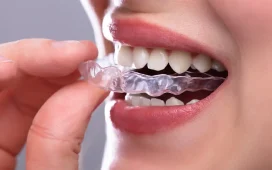Do you find yourself clenching your teeth throughout the day? You’re not alone. Many people suffer from bruxism, or teeth grinding, due to stress.
While it may seem like a harmless habit, bruxism can lead to serious oral health problems. A few issues include tooth damage and jaw pain.
If you’re looking for ways to stop clenching your teeth, here are a few tips to try.
1. Identify Your Triggers
One of the first steps is to identify your triggers.
What activities or situations cause you to clench your teeth?
For some people, stress or anxiety may lead to bruxism. Others may clench their teeth when concentrating on a task or when tired.
Once you have identified your triggers, you can begin to work on avoiding them.
Try relaxation techniques such as deep breathing or meditation if stress triggers you. If you tend to clench your teeth when tired, get enough sleep each night.
2. Relax Your Jaw Muscles
One way to stop clenching your teeth is to relax your jaw muscles. For example, you can place your tongue behind your upper teeth and gently press on your back molars. It will help to release the tension in your jaw and allow your mouth to close smoothly.
Another way to relax your jaw muscles is to massage them with your fingers. Use circular motions and apply pressure if needed. You should also avoid eating hard or chewy foods, which can exacerbate the problem.
You may find that you still struggle to break the habit. If that’s the case, you may need to consult with a dentist or doctor. They may have a series of exercises you can try. And, they may suggest that you wear a night guard while you sleep, for example.
3. Wear a Mouth Guard at Night
Mouth guards are flexible appliances that fit over your teeth. A mouth guard cushions your teeth. It also prevents the teeth from coming into direct contact with each other.
Unfortunately, clenching and grinding your teeth can cause a lot of wear and tear on your mouth. So, wearing a night guard can help to protect them. JS Dental Lab gives you the scoop on night guards should you choose to get one.
In addition, night guards can also help to treat conditions like TMJ (temporomandibular joint disorder).
Cushioning the teeth and preventing them from contacting each other directly is helpful. Over time, a night guard can help to reduce stress on the jaw joint. And when there’s less pressure on your jaw, you feel relief from pain and discomfort.
4. Practice Good Oral Hygiene
Brushing and flossing can help reduce stress in the jaw area and keep your teeth healthy. Good oral hygiene is essential for overall health, but it can also help to reduce teeth clenching.
Ensure you brush your teeth regularly. It would help if you also visited the dentist for regular examinations.
In addition, avoid foods that are hard to chew, and try to chew slowly and evenly. If you find you eat too fast and chew on hard foods, you cause extra stress on your jaw. So you must focus on caring for your jaw, so there’s no pain.
Take a break if you notice that you are clenching your teeth during the day. During your breather, focus on relaxing your jaw. You may also want to try exercises that specifically target the jaw muscles.
Over time, it’s possible to train yourself not to clench your teeth. As a result, you can reduce teeth clenching and enjoy better oral health with little effort.
5. See Your Dentist Regularly
In addition to practicing good oral hygiene, you must see your dentist regularly. Scheduling checkups and cleanings can keep your mouth healthy and clean.
You may have issues like gingivitis or cavities. If so, your dentist can help identify any problems early on. They can also recommend the appropriate treatment if needed.
If you’re concerned about teeth clenching, mention it to your dentist. With proper treatment, you can reduce the effects of bruxism and enjoy better oral health.
Conclusion
Teeth clenching can be challenging to break, but it’s essential to do so for your oral health. If you struggle to stop clenching your teeth, try identifying your triggers. Practicing relaxation techniques can also help. You may also want to wear a mouth guard at night or see your dentist for further suggestions. Applying these tips allows you to break the habit and enjoy better oral





